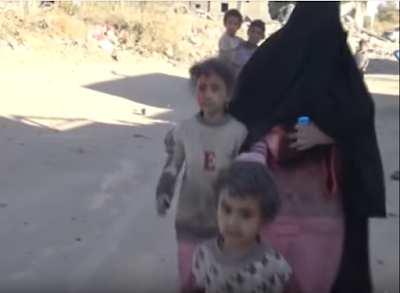 |
| The destroyed Sanaa house of Judge Yahya Roubaid, after it was hit in an airstrike carried out by the Saudi-led coalition, killing eight people. |
A
Saudi-led coalition strike killed a senior Yemeni judge and seven
members of his family at their home in the rebel-controlled capital
Sanaa, one of his relatives said on Monday.
"Judge Yehia Mohammed Rubaid, his son, three women, and three children where killed when a missile hit their home," his nephew Ahmed Mohammed told reporters.
Speaking in front of the debris of the destroyed house in central Sanaa, Mohammed said the attack was carried out overnight by coalition jets, which have been pounding rebels almost daily since March last year.
He said his uncle had presided over a court specialising in "terrorism cases" which tries suspects accused of links to Al-Qaeda.
- See more at: http://www.middleeasteye.net/news/saudi-led-coalition-strike-kills-yemen-judge-and-7-family-members-1866971697#sthash.irpICDAW.dpuf
"Judge Yehia Mohammed Rubaid, his son, three women, and three children where killed when a missile hit their home," his nephew Ahmed Mohammed told reporters.
Speaking in front of the debris of the destroyed house in central Sanaa, Mohammed said the attack was carried out overnight by coalition jets, which have been pounding rebels almost daily since March last year.
He said his uncle had presided over a court specialising in "terrorism cases" which tries suspects accused of links to Al-Qaeda.
- See more at: http://www.middleeasteye.net/news/saudi-led-coalition-strike-kills-yemen-judge-and-7-family-members-1866971697#sthash.irpICDAW.dpuf
A
Saudi-led coalition strike killed a senior Yemeni judge and seven
members of his family at their home in the rebel-controlled capital
Sanaa, one of his relatives said on Monday.
"Judge Yehia Mohammed Rubaid, his son, three women, and three children where killed when a missile hit their home," his nephew Ahmed Mohammed told reporters.
Speaking in front of the debris of the destroyed house in central Sanaa, Mohammed said the attack was carried out overnight by coalition jets, which have been pounding rebels almost daily since March last year.
He said his uncle had presided over a court specialising in "terrorism cases" which tries suspects accused of links to Al-Qaeda.
- See more at: http://www.middleeasteye.net/news/saudi-led-coalition-strike-kills-yemen-judge-and-7-family-members-1866971697#sthash.irpICDAW.dpuf
"Judge Yehia Mohammed Rubaid, his son, three women, and three children where killed when a missile hit their home," his nephew Ahmed Mohammed told reporters.
Speaking in front of the debris of the destroyed house in central Sanaa, Mohammed said the attack was carried out overnight by coalition jets, which have been pounding rebels almost daily since March last year.
He said his uncle had presided over a court specialising in "terrorism cases" which tries suspects accused of links to Al-Qaeda.
- See more at: http://www.middleeasteye.net/news/saudi-led-coalition-strike-kills-yemen-judge-and-7-family-members-1866971697#sthash.irpICDAW.dpuf
A
Saudi-led coalition strike killed a senior Yemeni judge and seven
members of his family at their home in the rebel-controlled capital
Sanaa, one of his relatives said on Monday.
"Judge Yehia Mohammed Rubaid, his son, three women, and three children where killed when a missile hit their home," his nephew Ahmed Mohammed told reporters.
Speaking in front of the debris of the destroyed house in central Sanaa, Mohammed said the attack was carried out overnight by coalition jets, which have been pounding rebels almost daily since March last year.
He said his uncle had presided over a court specialising in "terrorism cases" which tries suspects accused of links to Al-Qaeda.
- See more at: http://www.middleeasteye.net/news/saudi-led-coalition-strike-kills-yemen-judge-and-7-family-members-1866971697#sthash.irpICDAW.dpuf
"Judge Yehia Mohammed Rubaid, his son, three women, and three children where killed when a missile hit their home," his nephew Ahmed Mohammed told reporters.
Speaking in front of the debris of the destroyed house in central Sanaa, Mohammed said the attack was carried out overnight by coalition jets, which have been pounding rebels almost daily since March last year.
He said his uncle had presided over a court specialising in "terrorism cases" which tries suspects accused of links to Al-Qaeda.
- See more at: http://www.middleeasteye.net/news/saudi-led-coalition-strike-kills-yemen-judge-and-7-family-members-1866971697#sthash.irpICDAW.dpuf
Breaking tweets at that time:
عاجل#صنعاء: استشهاد القاضي ربيد يحيى وزوجته وجرح آخرين جراء الغارة التي استهدفت منزله بحي النهضة وسط العاصمة#اليمن pic.twitter.com/1JoIrSyQXx— قناةالمسيرةAlmasirah (@MasirahTV) January 25, 2016
Judge Yahya Robaid home #Sanaa #Yemen destroyed by #Saudi #UAE killin him,his waif,his son Salaah&wife&their 3 sons pic.twitter.com/Ki32lcEKZD— Hussain Albukhaiti (@HussainBukhaiti) January 25, 2016
مشاهد قاسية: الطيران #السعودي يقتل القاضي" يحيى ربيد " و6 من أسرته بينهم أطفال ونساء في حي النهضة #صنعاء#منبر_اليمن pic.twitter.com/k7E7hGXk2w— منبر اليمن (@Tribuneofyemen) January 25, 2016
#KSA-killed Judge Yahya Obaid was head of Terrorism-specialized court (NB crime Evidence HQ also attacked sameNight) https://t.co/3a6U42dfWB— Dr Karim (@StopDestroyYem) January 25, 2016
 |
| https://twitter.com/WeenAlEnfigar/status/691512813764923392 |
 |
| https://twitter.com/WeenAlEnfigar/status/691512813764923392 |
Close ur eyes&Imagine4seconds,u sleep wth ur entire family here#Saudi #UAE jet bombd Judge Yahya home #Sanaa #Yemen pic.twitter.com/NFAgHuRvfG— Hussain Albukhaiti (@HussainBukhaiti) January 25, 2016
Prayers&funeral of #Yemen-i Judge Yahya&2 of his grand children killed by #Saudi #UAE CO strike in #Sanaa ystr#EU pic.twitter.com/ZWOxflZZCv— Hussain Albukhaiti (@HussainBukhaiti) January 26, 2016
On #Yemen airstrike targeting judge's home, UN Spox now generically condemns it, but only when asked. Where's enovy IOCA?— Inner City Press (@innercitypress) January 25, 2016
Ref: 16012501






























